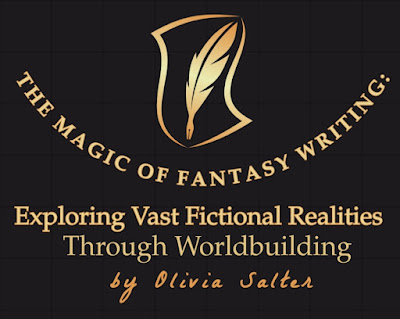The Magic of Fantasy Writing: Exploring Vast Fictional Realities through Worldbuilding
by Olivia Salter
Fantasy
writing serves as a gateway to boundless imagination, allowing readers
to escape the constraints of the real world and journey into incredible
realms of wonder. From enchanting lands inhabited by mythical creatures
to daring adventures through uncharted territories, fantasy literature
offers a captivating escape from reality. At the heart of these
fantastic tales lies the art of worldbuilding, where authors craft
intricate and immersive fictional realities to transport readers to
extraordinary realms. This article explores the power of fantasy writing
and the pivotal role worldbuilding plays in creating rich and expansive
fictional worlds.
Unleashing Imagination through Worldbuilding:
Fantasy
writing is blessed with a unique freedom: the absence of scientific and
societal boundaries. Fantasy authors are unrestricted by the laws of
physics, history, and cultural norms, enabling them to create diverse,
awe-inspiring realms limited solely by the depths of their imagination.
Through the process of worldbuilding, authors delve into the minutiae of
these fictitious realities, shaping everything from geography and
history to magic systems and distinct cultures.
Immersive imagery and vivid description:
One
of the key elements of worldbuilding is the art of immersive imagery
and vivid description. Fantasy authors strive to ignite readers' senses
by painting detailed landscapes, thriving civilizations, and
awe-inspiring magic systems. By skillfully weaving descriptive prose,
authors enable readers to see, hear, smell, taste, and feel the allure
of these fantastic realms, making them come alive within the reader's
mind. From the towering spires of elven cities to the secrets whispered
by ancient tomes, each detail immerses the reader further into the
author's imagined world.
Rich Characters and Diverse Cultures:
Worldbuilding
extends beyond creating just a vivid setting; it involves the creation
of complex characters and diverse cultures that inhabit these
fantastic realms. In fantasy literature, readers are introduced to
heroes, villains, and everything in between—each with their own
motivations, fears, and struggles. These characters bring depth and
humanity to the story, enabling readers to form deep connections and
become emotionally invested in their journeys.
Furthermore,
fantasy worlds are often home to diverse cultures influenced by their
unique histories, beliefs, and traditions. As authors develop these
societies, they explore concepts of governance, social dynamics, and
moral systems, creating thought-provoking reflections of our own world
in a new context. Through these cultural landscapes, fantasy writing
provides opportunities for readers to challenge their perspectives,
question societal norms, and ponder moral dilemmas.
Magic and Imaginary Systems:
Fantasy
worlds are frequently infused with magic, offering authors the chance
to imagine enchanting systems that bend the rules of reality. From
ancient incantations to mysterious artifacts, authors develop intricate
frameworks that govern the use and limitations of magic, adding depth
and intrigue to their fictional realities. Magic can be a central force
driving the plot, influencing characters' lives, and shaping the world
itself. It opens doors to endless possibilities, allowing readers to
escape into realms where the impossible becomes possible.
In
conclusion, fantasy writing and worldbuilding provide an avenue for
authors and readers alike to explore vast arrays of fictional realities.
The power of imagination knows no boundaries in the realm of fantasy,
as authors create captivating worlds that captivate readers and allow
them to dream beyond the confines of their daily lives. Through
immersive worldbuilding, fantasy literature grants us the freedom to
envision extraordinary landscapes, diverse cultures, and magical
systems, providing an enchanting escape into realms that exist only
within the pages of a book. So, dive into the world of fantasy and allow
your imagination to take flight!
Also see:


No comments:
Post a Comment